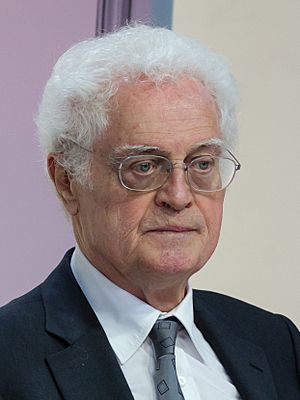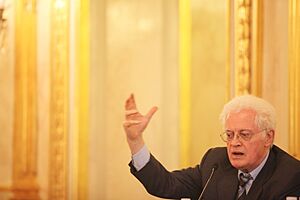Lionel Jospin facts for kids
Quick facts for kids
Lionel Jospin
|
|
|---|---|

Jospin in 2014
|
|
| Prime Minister of France | |
| In office 2 June 1997 – 6 May 2002 |
|
| President | Jacques Chirac |
| Preceded by | Alain Juppé |
| Succeeded by | Jean-Pierre Raffarin |
| Member of the Constitutional Council | |
| In office 6 January 2015 – 11 March 2019 |
|
| Appointed by | Claude Bartolone |
| President | Jean-Louis Debré Laurent Fabius |
| Preceded by | Jacques Barrot |
| Succeeded by | Alain Juppé |
| First Secretary of the Socialist Party | |
| In office 14 October 1995 – 2 June 1997 |
|
| Preceded by | Henri Emmanuelli |
| Succeeded by | François Hollande |
| In office 24 January 1981 – 14 May 1988 |
|
| Preceded by | François Mitterrand |
| Succeeded by | Pierre Mauroy |
| Minister of National Education | |
| In office 12 May 1988 – 2 April 1992 |
|
| Prime Minister | Michel Rocard Édith Cresson |
| Preceded by | René Monory |
| Succeeded by | Jack Lang |
| Minister of Youth and Sport | |
| In office 12 May 1988 – 16 May 1991 |
|
| Prime Minister | Michel Rocard |
| Preceded by | Alain Calmat |
| Succeeded by | Frédérique Bredin |
| Personal details | |
| Born | 12 July 1937 Meudon, Seine-et-Oise, France |
| Political party | Socialist Party |
| Other political affiliations |
Internationalist Communist Organisation (historical) |
| Spouses | Élisabeth Dannenmuller (div). Sylviane Agacinski |
| Children | Eva and Hugo |
| Alma mater | Sciences Po École nationale d'administration |
| Signature |  |
Lionel Robert Jospin (born 12 July 1937) is a French politician who was the Prime Minister of France from 1997 to 2002. He was a leading member of the Socialist Party.
Jospin ran for President of France twice, in 1995 and 2002. In 1995, he came very close to winning but was defeated by Jacques Chirac. In 2002, he surprisingly lost in the first round of voting. This led him to announce he was leaving politics.
Later, in 2015, he was appointed to the Constitutional Council, an important legal body in France.
Contents
Early Life and Political Start
Lionel Jospin was born in Meudon, a suburb of Paris. He went to top schools like Sciences Po and the École nationale d'administration (ÉNA), where many of France's leaders are trained. As a student, he protested against the war in Algeria.
After finishing his studies in 1965, he started working for the government in the Ministry of Foreign Affairs. In 1971, he joined the new Socialist Party (PS). He became a close ally of François Mitterrand, who was elected president of France in 1981. Jospin then became the leader of the Socialist Party.
From 1988 to 1992, Jospin served as the Minister of National Education. During this time, he worked to improve schools, reform how teachers were trained, and raise their salaries.
After the Socialist Party lost the 1993 election, Jospin lost his seat in the National Assembly and said he was retiring from politics. However, he made a comeback just two years later.
Prime Minister of France (1997-2002)

In 1997, President Jacques Chirac called for a surprise election. His plan did not work, and a coalition of left-wing parties, led by Jospin, won. This forced Chirac to appoint Jospin as Prime Minister. This situation, where the President and Prime Minister are from opposing political parties, is called "cohabitation" in France.
As Prime Minister, Jospin's government made many important changes.
Work and the Economy
One of the most famous laws passed by Jospin's government was the 35-hour workweek. This law reduced the standard working week from 39 to 35 hours without a loss in pay for many workers. The goal was to create more jobs by sharing the available work.
His government also helped lower unemployment, which fell by 900,000 during his time in office. They also created a special payment for low-wage workers called an "employment premium" to encourage people to work.
Health and Social Programs
Jospin's government created the Couverture maladie universelle (CMU), which means Universal Health Coverage. This program gave health insurance to people with the lowest incomes, making healthcare a right for everyone in France.
Many other programs were started to fight poverty and help people in need. The government increased financial aid for families, improved housing for the poor, and guaranteed that people would not have their water or electricity cut off if they couldn't pay their bills.
Education and Youth

Jospin's government increased spending on education. They started programs to help students with disabilities and created local contracts to improve education and teach good citizenship. They also launched campaigns to stop bullying in schools.
For young people, his government created thousands of new childcare places and introduced paid paternity leave, allowing fathers to take time off work after a child is born.
Other Important Changes
- Women in politics: A law was passed that required political parties to have an equal number of male and female candidates in elections.
- Civil unions: The government created the PACS, a type of civil union for any two people, including same-sex couples.
- Disability rights: New laws were passed to fight discrimination and improve access for people with disabilities to public transport and buildings.
2002 Presidential Election and Retirement
Jospin ran for president again in 2002. He was expected to do well and face Jacques Chirac in the final round. However, the campaign focused heavily on crime, an area where some felt his government had not done enough.
With many other left-wing candidates in the race, the vote was split. In a shocking result, Jospin finished in third place, behind both Chirac and the far-right candidate Jean-Marie Le Pen. Because he did not make it to the second round, he immediately announced his retirement from politics and stepped down as Prime Minister.
Later Years
After leaving office, Jospin mostly stayed out of the public eye. He did campaign for the proposed European Constitution in 2005.
In 2012, President François Hollande asked Jospin to lead a special commission on ethics in French politics. From 2015 to 2019, he served as a member of the Constitutional Council, one of France's highest legal authorities.
Political Offices Held
Government Jobs
- Prime Minister: 1997–2002
- Minister of National Education: 1988–1992
- Minister of Youth and Sport: 1988–1991
Elected Positions
- Member of European Parliament: 1984–1988
- Member of National Assembly of France: 1981–1986, 1986–1988, 1992–1993
- Regional Councillor of Midi-Pyrénées: 1992–1997
- General Councillor of Haute-Garonne: 1988–2002
- Councillor of Paris: 1977–1986
Political Party
- First Secretary (Leader) of the Socialist Party (France): 1981–1988, 1995–1997
See also
 In Spanish: Lionel Jospin para niños
In Spanish: Lionel Jospin para niños
- Politics of France
- List of prime ministers of France
 | Precious Adams |
 | Lauren Anderson |
 | Janet Collins |


